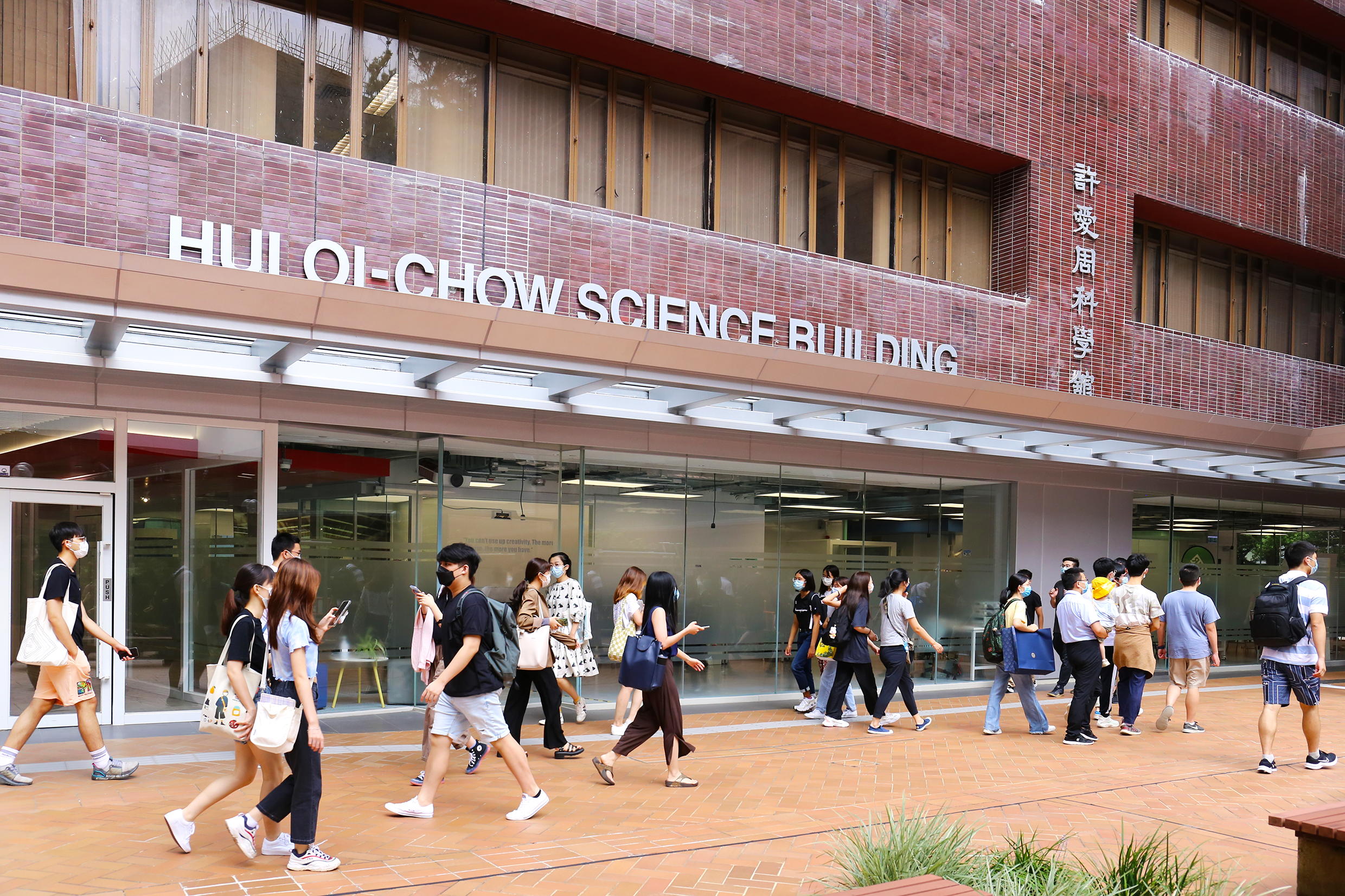

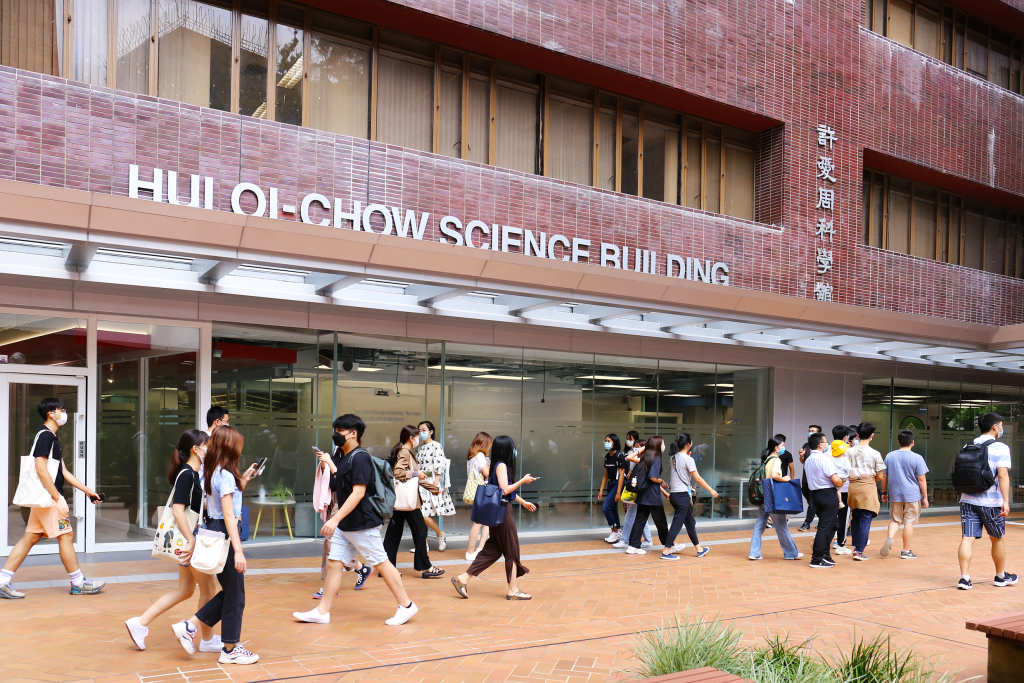
Following two years of mainly online teaching and learning, HKU has almost entirely resumed face-to-face classes in the 2021–22 academic year.
Teaching and Learning
BACK TO THE FUTURE
The disruptions caused by the social movement and the COVID-19 pandemic have been a trial for teaching and learning over the past two years. But the University has emerged with a strongly affirmative message: we returned to nearly full face-to-face learning in September 2021, while drawing on the experiences of online learning to enhance our teaching. We have also reaffirmed our core educational values after wide-ranging consultations and will continue to pivot the curriculum towards innovation, interdisciplinarity, internationalism and the opportunities of the Greater Bay Area (GBA).
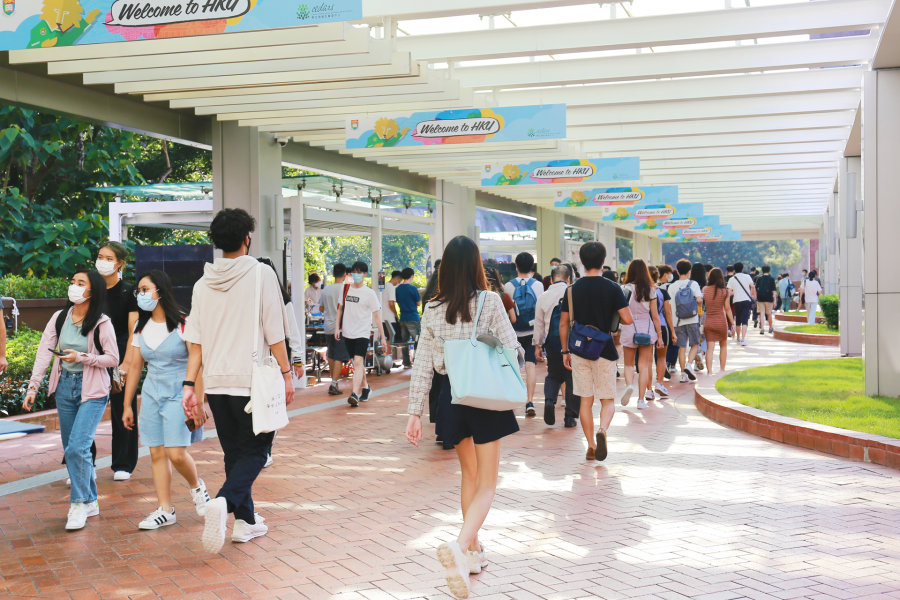
From September 2021, most students are back attending classes on campus, in rooms filled to only 75% capacity as an ongoing social distancing precaution.
Returning to Campus
HKU’s teaching staff made enormous efforts and adaptations over the past two years to ensure students could continue to fulfil graduation requirements, even in hands-on clinical programmes. Teachers have been ably supported by the Centre for the Enhancement of Teaching and Learning, which has supported course re-design and helped staff navigate new pedagogies and tools for online and hybrid teaching, and the Technology-Enriched Learning Initiative, which has developed new teaching tools. Technological innovation has been a major focus of this work, but at the same time it has made one thing resoundingly clear: technology cannot replace the rich experiences and personal development of in-person encounters.
Surveys of both teachers and students have found overwhelming support for face-to-face learning, which the University endorses. From September 2021, arrangements have been made for 75% capacity in classrooms, while still giving highest priority to health and safety. Student enrichment activities are also moving offline. Although virtual exchanges were held with some partners during 2020–21, we plan to return to in-person exchanges in 2021–22 as far as possible and to send and receive about 1,500–2,000 students in total. We will continue to explore the use of virtual engagement, for instance in enabling more students to interact with their counterparts in less-privileged parts of the world, but it will not be a replacement for the advantages of being physically immersed in another place and culture.
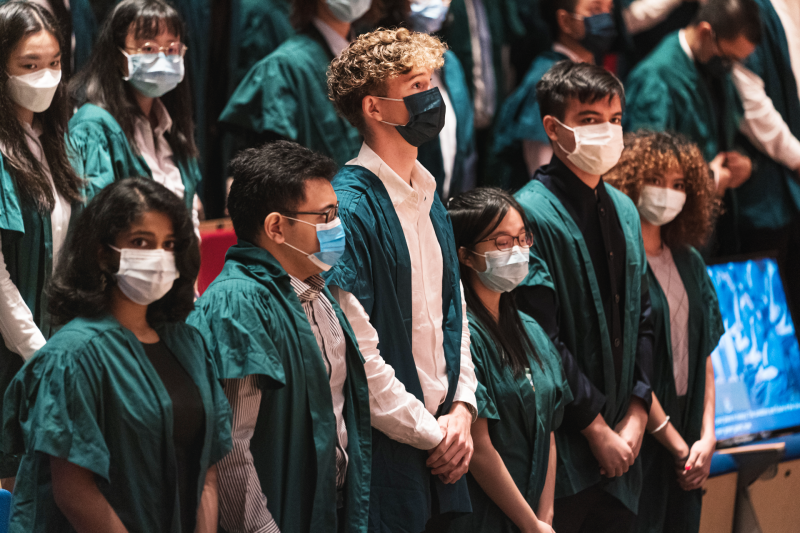
Last year’s Inauguration Ceremony for New Students was held online due to the pandemic. This year, the ceremony returned to the Grand Hall and first-year students were able to attend – and be welcomed to the University – in person.
Top Students Continue to Choose HKU
The University’s success in providing a rigorous, value-added education even during the pandemic has sustained our ability to attract outstanding students. Students were admitted from more than 40 countries and among them were more than 100 top scorers of qualifications such as the Hong Kong Diploma of Secondary Education Examination (HKDSE), IB, Gaokao, GCE A-levels and national examinations.
To recognise and support high achievers, the HKDSE Top 1% Scholarship was launched, offering at least HK$50,000 to new students who score among the top 1% in the HKDSE; 115 students were eligible. The University encourages students to pursue their dreams in different disciplines by giving out generous scholarships. The President’s Scholars admitted in 2021 have chosen such areas of study as architecture, arts, business, dentistry, engineering, law, medicine and social sciences. A new Direct Admission Scheme for Top Athletes was also announced and will start to admit students to selected academic programmes mainly based on sporting achievement from 2022–23.
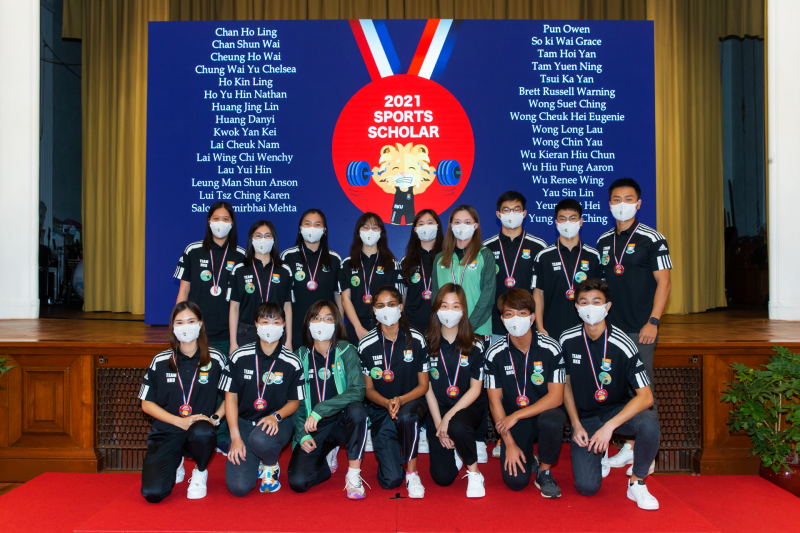
HKU offers scholarships to outstanding student athletes admitted through the Sports Scholarship Scheme.
Supporting Students’ Development
To welcome new students, the Co-Curricular Support Office was established in summer 2021 to provide administrative support for student clubs and societies in organising orientation and induction activities in conjunction with the Centre of Development and Resources for Students. The latter also continued to organise the inauguration ceremony, non-academic induction talks (held online) and orientation sessions for non-local students, as well as a wide range of support services, such as psychological counselling and a virtual job fair that attracted more than 140 companies and organisations offering well over 2,000 vacancies. To provide new graduates with options during uncertain times, the University extended the Taught Postgraduate Scholarship Scheme and HKU Graduate Internship Programme.
Enrichment activities have also continued through outings around Hong Kong and, as mentioned, virtual exchanges. The Common Core supports a range of interdisciplinary virtual student exchange projects in Europe, the UK, and Australasia. It also, through its TransDisciplinary Undergraduate Research Initiative, continues to provide a structured format for all students to step beyond their disciplines into guided inquiry, which aligns with the wider goal of expanding research across the curriculum as supported in our 2020–21 review of teaching and learning.
Our Educational Values Reaffirmed
That overarching review involved input from more than 550 teaching staff and more than 1,000 students and recent graduates, and drew on the lessons learned during COVID-19 to create a teaching and learning strategy for 2021–28. The strategy, approved by the Senate in July, reaffirms the soundness of our core educational aims: critical intellectual inquiry, tackling unfamiliar situations and ill-defined problems, critical self-reflection, understanding and respecting cultural differences, effective communication and collaboration, and leadership and advocacy for a better world.
At the same time, new elements have been moved to the forefront to support the University’s wider vision of innovation and impact. In addition to undergraduate research, these include interdisciplinarity and cosmopolitanism (for example, having an international element in capstone projects). The strategy also recognises that some aspects of online learning are here to stay as we explore the possibilities of changing up and enhancing classroom learning.
New Ways to Contribute to the Future of Hong Kong and the GBA
As well as nailing down our educational principles, we have been developing new data-driven undergraduate programmes to meet the needs of Hong Kong and the GBA as they develop into an innovation hub. The new Bachelor of Engineering in Data Science and Engineering, Bachelor of Arts in Humanities and Digital Technologies, Bachelor of Science in Bioinformatics, Bachelor of Business Administration in Business Analytics, and Bachelor of Science in Marketing Analytics and Technology will produce graduates who are adept at applying AI and data to a wide variety of issues and challenges.
New teaching and student facilities are also being developed to accommodate growing enrolments. Learning spaces are being added at Pokfield Road and the medical campus, and new student residences are under construction. In the longer term, the new Shenzhen campus, announced in 2021, will enable students to engage more directly with the burgeoning opportunities of the GBA.
COVID-19 may have restricted learning opportunities in the short term, but it has also accelerated innovation and underscored the value of our educational mission. Teaching and learning at HKU is emerging stronger from this difficult test of our will and commitment.
100
+
top scorers
Top scorers achieved the highest results in the Hong Kong Diploma of Secondary Education Examination (HKDSE), IB, GCE A-levels, Gaokao and national examinations.
40
+
nationalities
Students admitted to HKU have come from places as diverse as Brazil, Denmark, Iran, Kyrgyzstan, Mauritius, Panama, Spain and Turkey.
CLINICAL TRIALS
COVID-19 created a huge challenge for disciplines that require students to have contact with patients. Teachers found creative solutions that met curriculum demands and opened new avenues for engagement.
Dental Students Get Back in Touch with Patients
The dilemma of balancing safety with professional training has been a major concern for dentistry, which was deemed to have the highest COVID-19 occupational risk by the US Department of Labour. “About 80 per cent of our teaching is clinical and cannot be taught online,” said Professor Thomas Flemmig, Dean of Dentistry and Kingboard Professor in Advanced Dentistry. “But in dentistry we have procedures, such as drilling, that create this blast of aerosols.” When in-person teaching was halted across the University in early 2020, the Faculty of Dentistry immediately went to work finding a feasible way to get students back into the clinic.
Following much consultation with staff and students, a set of safety measures was arrived at to allow students to start treating patients in person from May 2020. This included mandatory SARS-CoV-2 testing for all students and staff, enhanced infection control through increased spacing in clinics and additional personal protective equipment, and input from the Faculty of Engineering on the best extra-oral suction devices for reducing aerosols (the chosen device reduces them by about 90%). An additional daily clinic was added, as were summer sessions, to increase capacity given the reduced number of patients per clinic.
As a result, students have been able to acquire and demonstrate the required competencies to graduate, albeit with a few extra months of study. “Our graduates need to be competent clinicians who can perform invasive, irreversible procedures – drill and fill – on live patients,” Professor Flemmig said. “The measures we have introduced have allowed us to have stable patient care and clinical teaching, even during waves of the pandemic.”

Dental students are required to wear personal protective equipment (PPE) and face shields in the Simulation Laboratory even if they are not treating real patients.
Tech Solutions for the Medical Faculty
The medical and nursing programmes used technology to ensure their students continued to be exposed to real patient scenarios during COVID-19 restrictions.
The School of Nursing, for instance, drew on its earlier experience with technologies such as a simulation laboratory, immersive virtual reality, high-fidelity simulation and robotics, and increased their use in clinical teaching and learning. Students were provided with high- and mid-fidelity simulated activities in a ward-like laboratory, and virtual simulation involving virtual patients with pre-set vital signs and scenarios. Technology was also used for clinical assessment of 188 final-year nursing students who, in place of face-to-face sessions, performed virtual care, engaged in self-reflection and considered how to apply their new learning in practice. A study by the School found that students using these technologies developed similar clinical competencies and reported greater satisfaction and self-confidence compared with traditional simulation. The School’s success in using all these technologies won the University’s 2020 Teaching Innovation Award, which was bestowed in March 2021.
“Simulation education can never completely mirror the value of clinical practicum in hospital wards, but it meant we could provide a safe platform for students to learn professional skills and procedures,” said Dr Veronica Lam Suk-fun of the School.
The MBBS programme also deployed technology and supervised teleconsultations, and is now developing telemedicine to be a permanent feature of the Family Medicine rotation. “The principles central to physician-patient relationships still apply to telemedicine: students are held to the same standards, responsibilities, ethical considerations and the like, whether they see patients via teleconsultation or in person,” said Dr Anderson Tsang Chun-on, who has spearheaded the telemedicine initiative.
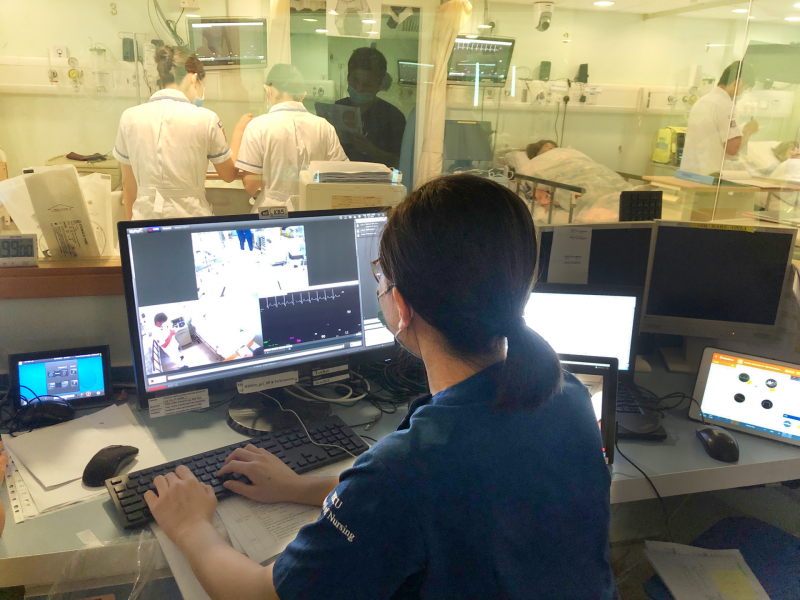
Nursing students taking part in simulated activities in a laboratory setting that resembles an actual ward.
Speech Therapy through Zoom
Teleclinics have helped get speech and hearing sciences students over the COVID-19 hump and uncovered unexpected benefits.
Their adoption predated the pandemic, when trials of teleclinics began in summer 2019 to see if they could be used to reach patients in remote areas. This was quickly scaled up in 2020 to enable students to consult with patients over Zoom. Some patients were found to prefer this approach, particularly those with mobility issues due to Parkinson’s Disease and stroke, while others required adaptations. For young children, parents were trained to help support treatment delivered through Zoom, while for elderly patients with dementia, a clinical supervisor sat next to and supported patients in the nursing home while students conducted the online therapy sessions.
“This form of teleclinic meant students could get exposure to different institutional settings and other healthcare professionals, which was similar to the clinical experience they had before COVID-19,” said Associate Professor Dr Karen MK Chan, who leads the teleclinic team.
The teleclinic arrangements were originally intended to be temporary but the outcome has been so positive that preparations are now underway to make them a regular part of the speech therapy curriculum and develop more materials specifically for teleclinic use. Dr Chan and her team will also explore the possibility of administering teleclinics outside Hong Kong.
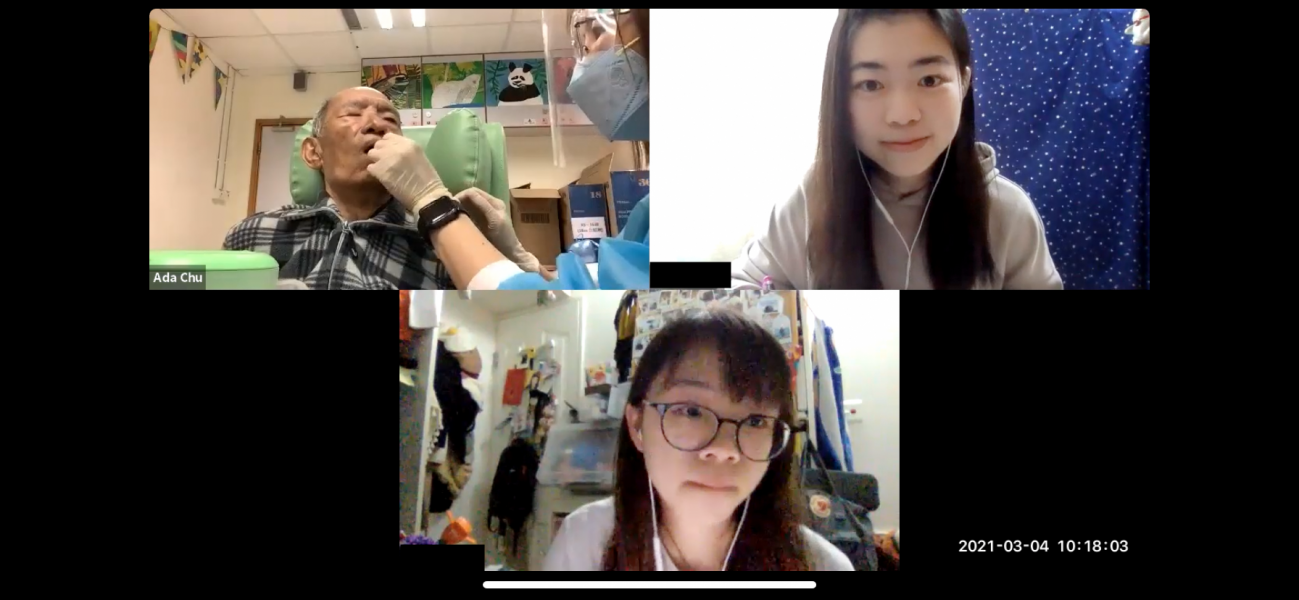
Students watching a teleclinic session of an on-site clinical educator with a patient in an old age home.
Engaging with the World
The pandemic may have put a halt to exchanges outside Hong Kong, but it has not prevented the University from finding other ways for students to have enriching activities beyond the classroom.
Going on a Virtual Exchange
Exchanges outside Hong Kong were severely disrupted in 2020 and much of 2021 due to COVID-19 lockdowns. So HKU and about 50 of our partner institutions decided to try another route to bring students to new environments, through virtual exchanges.
The situation required adaptations – credits were awarded only pass / fail grades, it was difficult to accommodate STEM courses requiring lab work, and time differences made it challenging for some students to participate in tutorial groups. Still, 159 HKU students participated in the exchanges and the University welcomed 79 students from outside Hong Kong.
“Our principle was to not hinder final-year students who need an overseas experience to fulfil graduation requirements. The University accepted the virtual programme to replace the in-person programme of before,” said Ms Iris Ip, programme manager of the International Affairs Office.
Krisya Louie, a Bachelor of Social Sciences student, did a full-year virtual exchange with the University of Chicago that was originally meant to be in person. “I didn’t want to give up the opportunity to learn from some of the brightest minds in psychology, so I continued with the exchange,” she said – and despite a schedule that often ended after 3am given time differences, she found the experience enriching. In addition to classes and interactions with leading scholars, she also participated in a virtual palaeontology expedition to Greenland and met up online with exchange students from around the world. “The intense pacing pushed me to learn a lot in a short time frame. It was an exciting challenge and I felt I learned a lot more about myself and what I was capable of.”
In-person exchanges remain the ideal, though, and are resuming in 2021–22. One of those participating is Ms Louie, who is now in her fourth year and a visiting scholar at Oxford University.
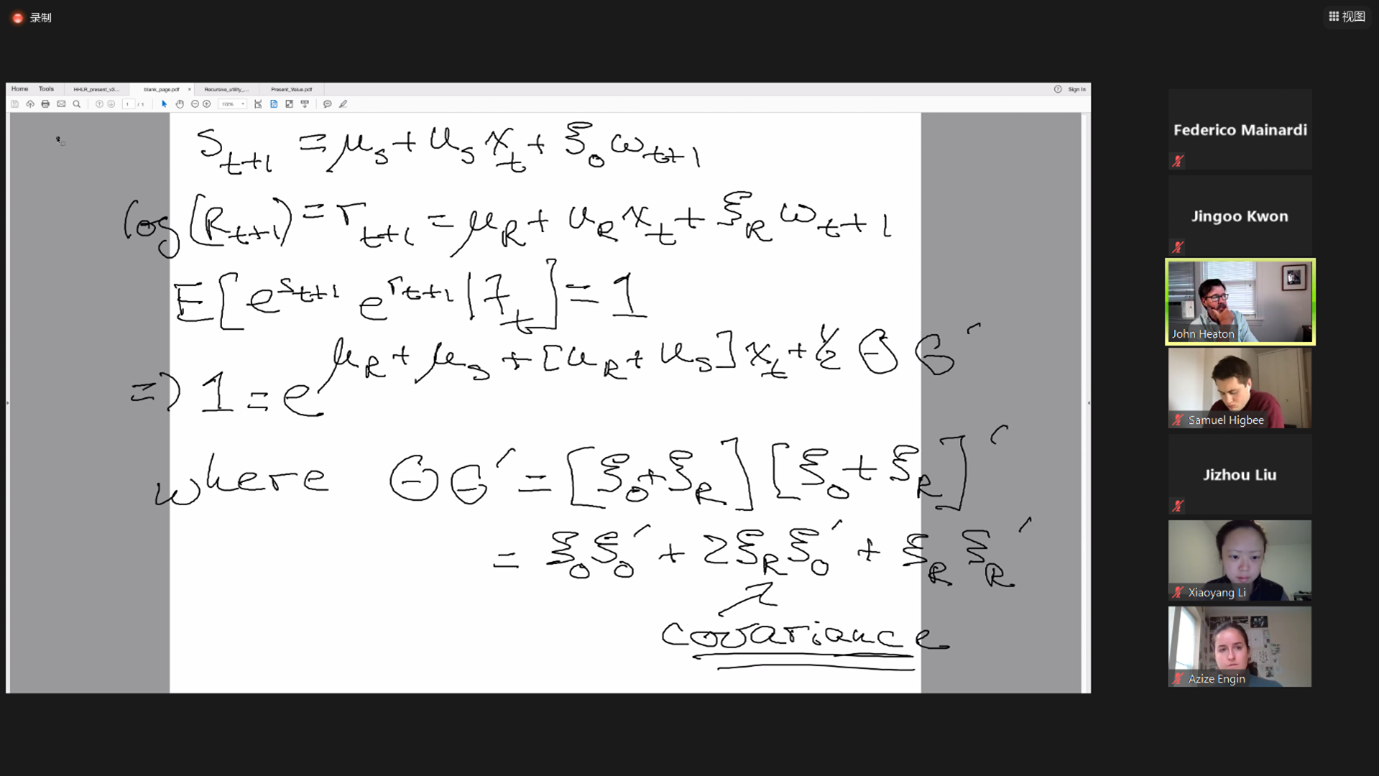
Student Huang Shunzhuang, who joined the virtual exchange at the University of Chicago, discussing asset pricing with classmates for a research project.
Creative Approaches to Teaching Archaeology
A planned expedition for undergraduate students to conduct archaeological fieldwork in the South Caucasus moved online and into the Hong Kong community in the wake of COVID-19.
The expedition was part of the new Bachelor of Education course Cultural Heritage and Information in the Field that was launched in summer 2020 by Dr Peter J Cobb in partnership with the Institute of Archaeology and Ethnography at the National Academy of Sciences of Armenia. They had to quickly adapt to the reality that an overseas trip was out of the question. “There were two main topics – dealing with the cultural heritage, i.e., the archaeology itself, and also dealing with the information science aspect of fieldwork – digital methods. The second aspect was quite straightforward to carry out without travel, but we also found creative ways to teach students about cultural heritage,” Dr Cobb said.
In 2020, students worked with their counterparts from Armenia and other students from the University of Pennsylvania on tasks such as 3D modelling and creating ceramics databases. Research posters that they produced were accepted to the Archaeological Institute of America’s annual meeting in January 2021.
One of the poster creators was Ms Agnes Sung Pui-yee, a biochemistry major, who became a teaching assistant to the course in summer 2021. The 2021 intake worked online, too, but this time students were taken on field trips to Hong Kong cultural heritage sites to gain hands-on experience in the physical processes of archaeology. “This course has made me reconsider my interests, passion and strengths,” said Ms Sung, who has decided to become an archaeologist.
Dr Cobb said that while students had enjoyed learning the new digital technologies and the Hong Kong field trips, he hoped they could get back to their original goal in 2022: taking students to Armenia.
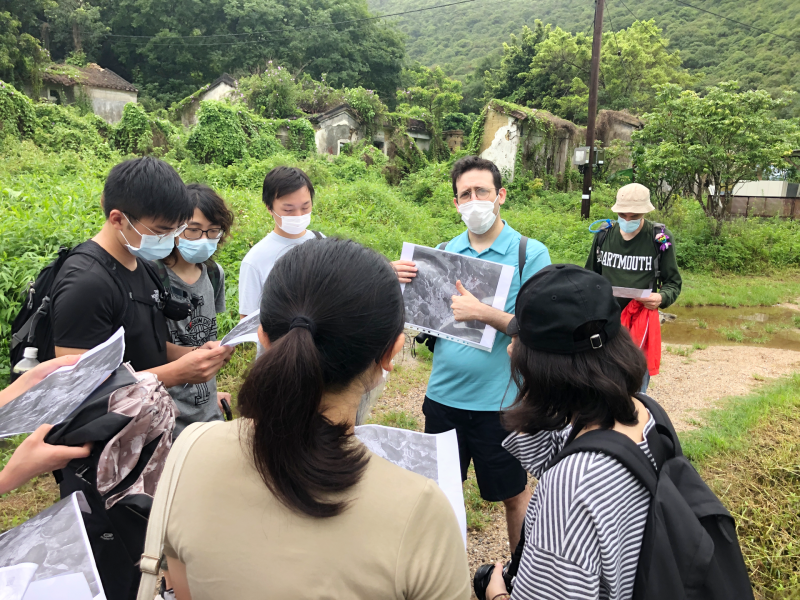
A visit to the Sha Lo Tung historical village, guided by Maxime Decaudin, Assistant Lecturer from the Division of Landscape Architecture. Students carried out mapping activities while making observations about irrigation, farmland, forests, and architecture in the local landscape.
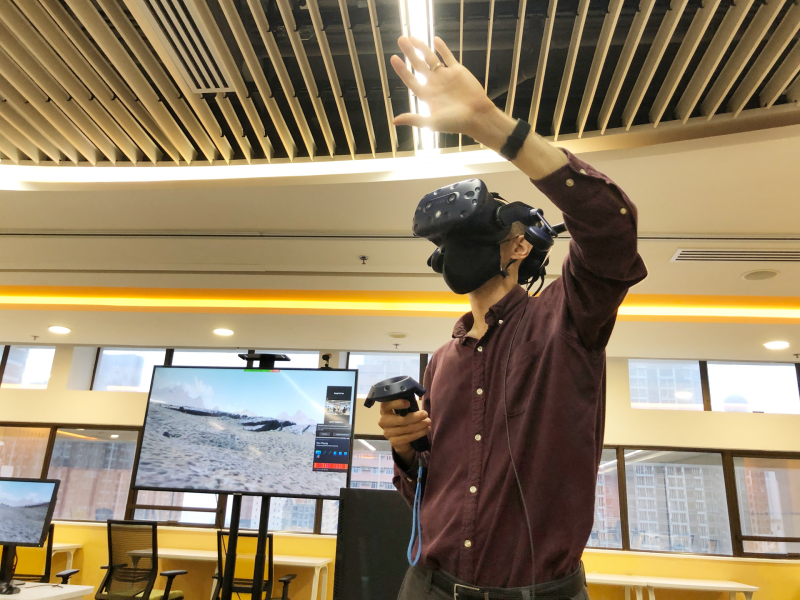
Students acting like they had been transported to the Vedi Fortress in Armenia, while actually being at the HKU Main Library and taken on a virtual reality tour of the archaeological site by Dr Peter J Cobb.
There’s No Place Like Home
Until the pandemic, HKU sent planeloads of students abroad every year for anything from one week to a full year to study, do service learning and undertake internships. When travel was put on hold, the HKU Horizons Office sought out broadening experiences within Hong Kong itself.
In collaboration with the School of Chinese and external partners, four programmes were organised on heritage-rich Lantau Island in 2021, focussing on religious diversity, cultural heritage and rituals, art and art creation, and the natural environment. Students visited monasteries and churches, participated in the Dragon Boat Festival and races, visited historic buildings, talked with artists and did outdoor sketching, and went on hikes, dolphin-watching and birdwatching. Another programme took students sailing around Hong Kong Island to learn about Hong Kong’s seafaring history, as well as basic navigation and sailing techniques. Each programme was limited to 12 participants under pandemic restrictions.
“The students were very positive about the experiences. For instance, although the majority were from Hong Kong and had been to Tai O [on Lantau], they knew nothing about what we showed them. It was an opportunity for them to join in local activities and talk to local people. They also conducted surveys in Tai O to help local people and helped make signage posts,” said Dr Parry Leung of HKU Horizons Office.
He added that the programmes will be continued and consideration is being given to how to make them more structured and in-depth. Dr Hayson Liu Shun-hei of the School of Chinese sees much possibility. “Cross-border travelling is not necessarily about visiting a foreign country. By studying our own history and contemplating our mind, we could continue to seek the unknown and broaden man’s quest for knowledge despite challenges,” he said.
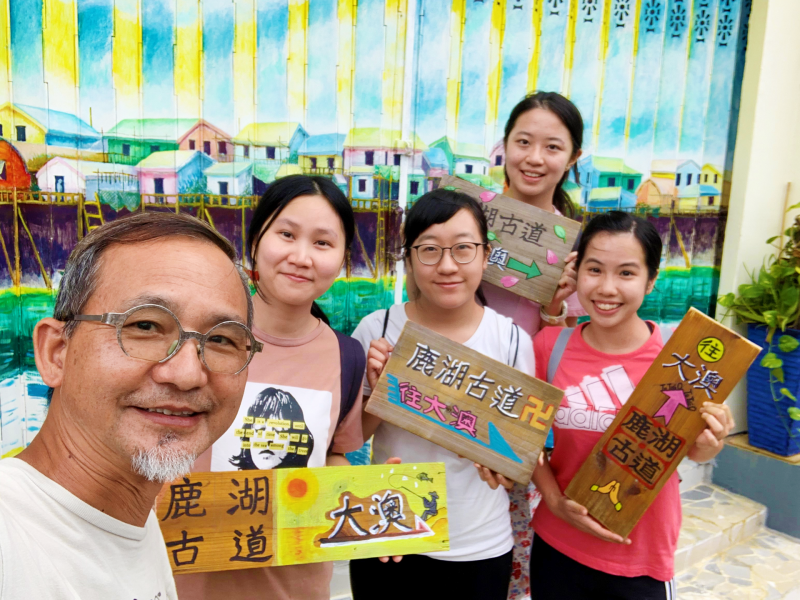
Students in the community service programme helped make signage for the Luk Wu to Tai O footpath.

The programme offers students an opportunity to visit stilt houses and talk to local people in Tai O.
Above and Beyond: High Achievers
The University welcomed recognition for its teaching excellence in 2020–21 and celebrated the sporting and academic achievements of its students.
Teachers Bring the Human Touch
Art historian Dr Koon Yee-wan and clinical psychologist and mental health social work academic Professor Daniel Wong Fu-keung were each recipients of the 2021 University Grants Committee Teaching Award, which honours outstanding teaching performance, leadership and scholarly contributions to teaching and learning across Hong Kong.
Dr Koon, of the Faculty of Arts, was honoured under the General Faculty Members category for her ‘art history in action’ strategy and her commitment to help students appreciate the wider value of art to society and themselves. She brings students into direct contact with art objects and people in the art world, and constantly challenges herself and her students to seek the story behind objects, for instance how a broken piece of pottery can tell a history of technology, trade or tastes.
“I’m often questioned about the usefulness of studying art history and my answer is simple: art teaches us empathy. This underscores my teaching philosophy, which can be summarised as a deep-seated appreciation for creativity, an excitement for active learning and a belief that art has immense social value,” she said.
Professor Wong, of the Faculty of Social Sciences, was part of a cross-institutional team honoured under the Teams category for their Joint University Mental-Wellness Project, which has applied positive psychology and experiential learning to enhance student mental well-being at five universities. About 4,000 students, 1,100 staff and professionals and 1,500 members of the community have benefitted.
“We employ a strength-based and process-oriented approach to maximise students’ potentials and capacity, and ultimately to facilitate them to live a flourishing life,” he said.
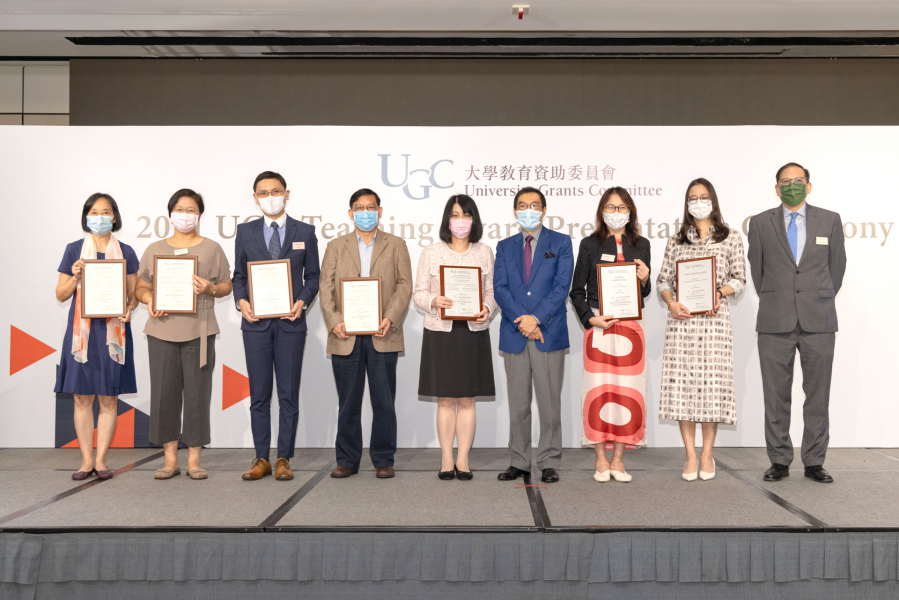
Dr Koon Yee-wan (third from right) and Professor Daniel Wong Fu-keung (fourth from left) at the 2021 UGC Teaching Award Presentation Ceremony.
(Courtesy of University Grants Committee)
HKU’s Olympians
Three HKU students were among the athletes competing at the Summer Olympics held this year in Tokyo and their achievements have been honoured with generous scholarships.
Windsurfer Hayley Chan (Arts), fencer Ryan Choi (Business) and triathlete Oscar Coggins (Engineering), were already HKU Sports Scholars when they competed and were awarded an additional HK$100,000 scholarship each to support their academic and sports career endeavours.
Hayley finished a personal best of eighth in her event and will continue training half-time and return to HKU to complete her degree in English Studies. “Sport has changed my life and I am grateful for the encouragement from the University. I look forward to witnessing more fellow students strive for excellence in world stadiums,” she said. Ryan will use the award to support his career development after he retires as a full-time athlete, while Oscar will use it to fund his studies and work towards competing in the 2024 Paris Olympics.
Two HKU alumni also competed in Tokyo – fencers Coco Lin (BA[Landscape Studies] 2017) and Moonie Chu (BSocSc 2021). To further support Hong Kong’s sporting stars, the HKU Sports Scholarship offered a total of HK$500,000 in scholarships and other support to outstanding student athletes in 2020–21, such as residential scholarships, subsidies for training and competition and academic advising. From 2022–23, the new Direct Admission Scheme for Top Athletes will offer competitive admission mainly based on sports achievements.
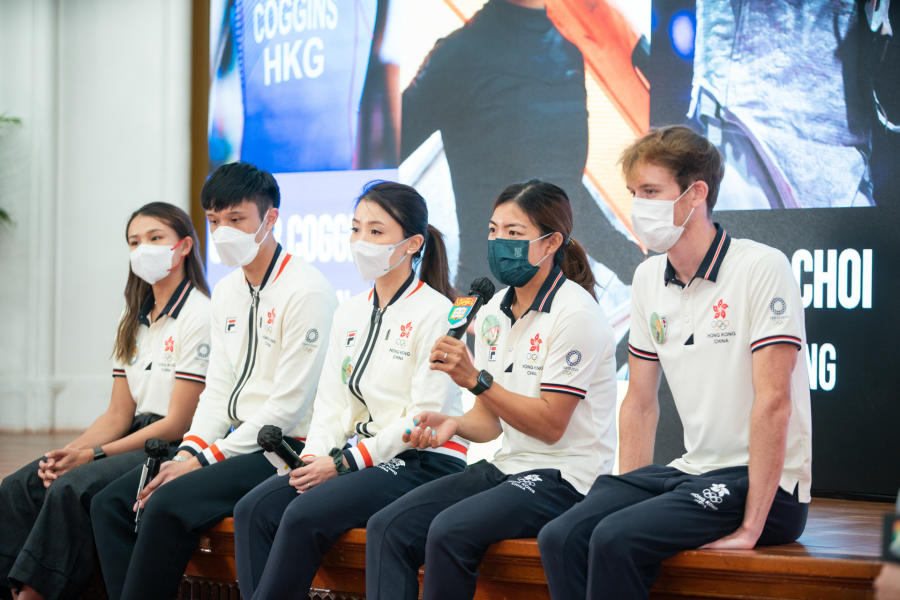
Three current HKU students (windsurfer Hayley Chan, fencer Ryan Choi and triathlete Oscar Coggins) and two alumni (fencers Coco Lin and Moonie Chu) represented Hong Kong in the Tokyo Olympics.
Making the Choice to Make a Difference
A passion for the environment and a desire to help Hong Kong achieve greater sustainability have inspired the path chosen by President’s Scholar Martin Chan Ho-hin.
President’s Scholars are the top HKDSE scorers in their faculties. Martin is studying a Bachelor of Science in Surveying, rather than subjects like medicine and law that are often the preference of top-flight performers. His resume also includes activities such as a project to enliven Kwun Tong Promenade, being an eco-tour guide for younger schoolmates, and studying the government’s conservation policies for historic buildings.
“I understand my choice of programme may sound unusual and indeed I hesitated at first. However, given my deep interest in the built environment, I would really like to learn more about land development and conservation policies and contribute to this field in the future,” he said.
Martin chose HKU for the quality of its teaching and its internationalism and said he hopes in future to put his learning to work helping Hong Kong better tackle the land-use challenges it faces and achieve greater sustainability in its urban development.
President’s Scholars are each awarded at least HK$100,000 in recognition of their outstanding achievements, to help cover such costs as tuition fees and overseas learning experiences.
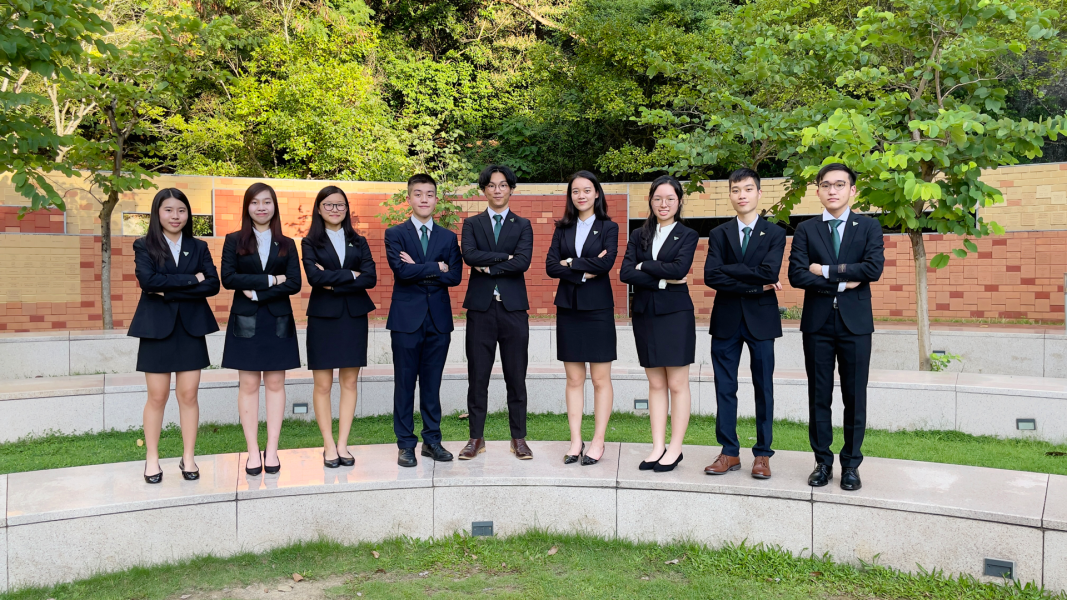
President’s Scholar Martin Chan (second from right) is one of the executive committee members in the Hong Kong Outstanding Students’ Association.
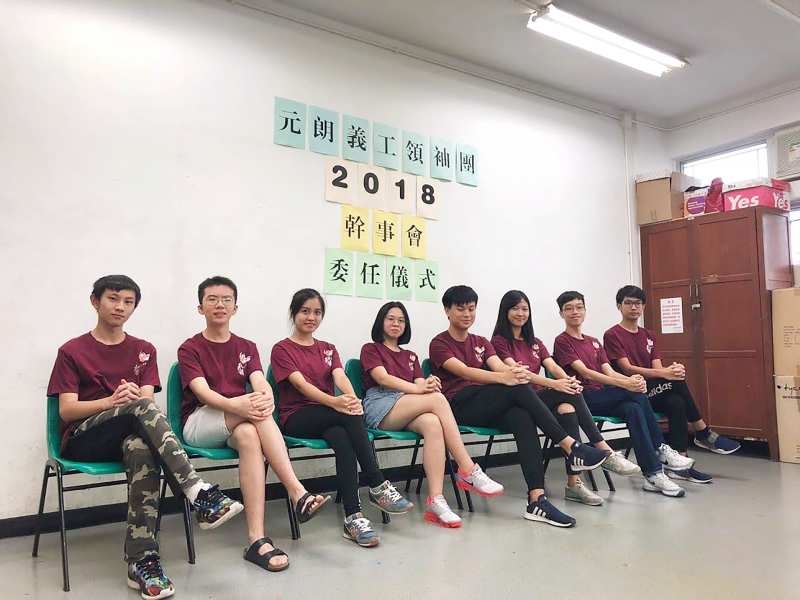
Martin (second from right) contributes to his neighbourhood by serving in the Yuen Long Volunteer Leaders Team.